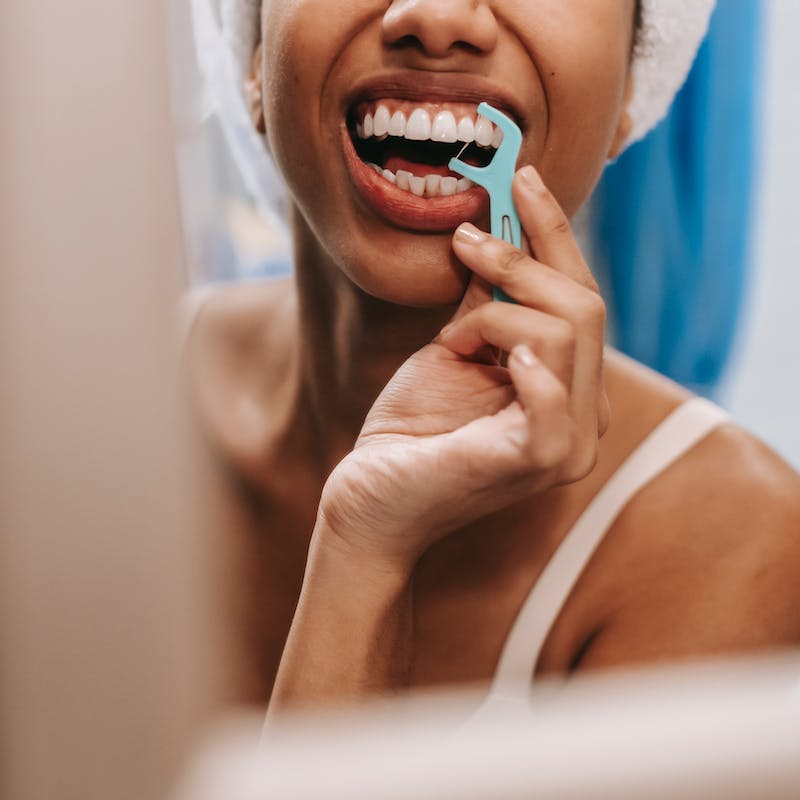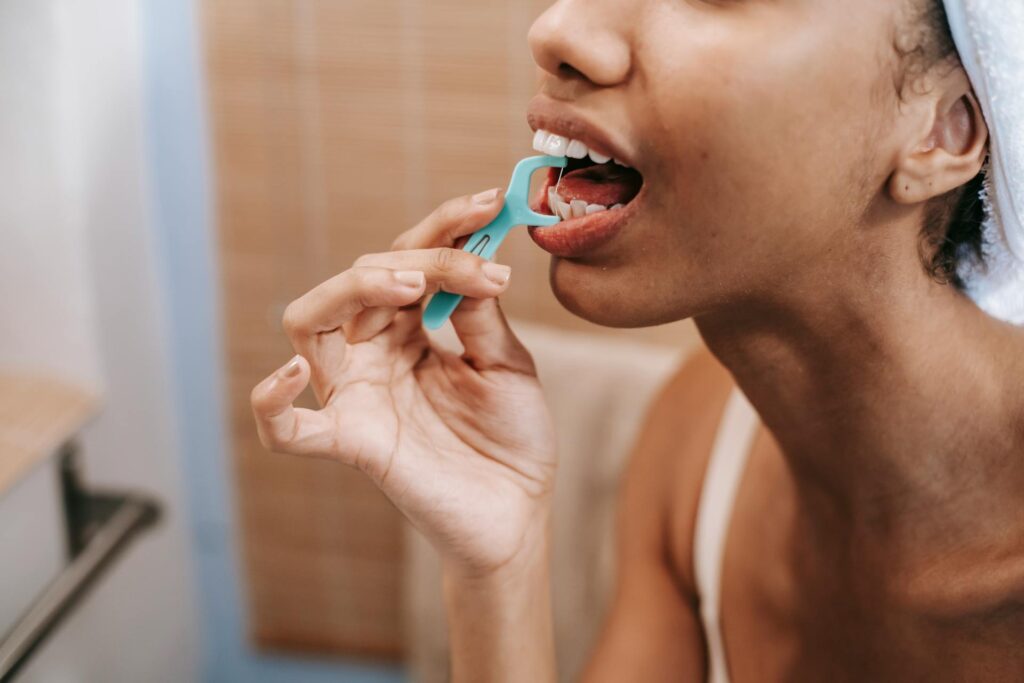Nov
16

While it may seem like a minor detail in our daily routines, the sequence in which we floss and brush can have significant implications for our oral health – but which is supposed to come first, brushing or flossing? In the following comprehensive guide, we’re going to take a look at the advantages and disadvantages of both approaches, and give you our own professional insights and practical tips. Let’s get started!
What Is Flossing?
When it comes to dental health, flossing often plays second fiddle to brushing. However, this understated part of our oral hygiene routine is actually pretty important when it comes to maintaining healthy teeth and gums: flossing effectively removes food particles and plaque lodged between teeth, especially in those hard-to-reach areas that toothbrush bristles might not adequately reach. Flossing isn’t just about keeping your smile bright; it’s about preventing gum disease, tooth decay, and bad breath.
Plus, the science speaks for itself: research indicates that when plaque builds up, it can lead to tartar, a hardened form of plaque that can cause gum disease (gingivitis) and, if unchecked, periodontitis, a more severe gum disease leading to tooth loss. And if you needed even more convincing, NHS guidelines reinforce the importance of flossing as a key element of oral hygiene, alongside regular brushing. In short, it’s not just about removing food debris; it’s about disrupting and removing plaque to keep gums healthy. But do you floss before or after brushing?
Also Read: Should You Disinfect Your Toothbrush Regularly?
Brushing First: Pros and Cons
Brushing teeth before flossing is a common practice for many, and the primary advantage of this approach is that it removes a significant portion of plaque and food debris from your teeth, potentially making the flossing process more effective and less messy. By brushing first, the fluoride from the toothpaste also gets better distribution between the teeth, which can help strengthen tooth enamel and prevent decay.
However, there are some downsides to this method. Brushing first can leave some plaque and food particles in the interdental areas, which might not be completely cleared by flossing afterwards. Moreover, flossing after brushing might not allow the fluoride from the toothpaste to reach the newly cleaned spaces between teeth, slightly reducing its beneficial effects.
Flossing First: Pros and Cons
On the flip side, flossing before brushing is gaining some popularity. The rationale behind this sequence is that flossing first loosens and removes food particles and plaque from between the teeth, creating a cleaner environment for the subsequent brushing action. This ensures that fluoride toothpaste can reach between teeth, maximizing its protective benefits.
However, this method is not without its drawbacks. Some find that flossing first can be a bit messier, especially if there are a lot of food particles between the teeth. Additionally, if not done thoroughly, flossing first might leave some plaque behind, which the toothbrush may not entirely remove.

Should You Floss or Brush First?
The debate between whether to floss before or after brushing boils down to personal preference and what you aim to achieve with your oral hygiene routine. If your primary goal is to maximize fluoride’s benefits from your toothpaste, flossing after brushing might be more beneficial; this method ensures fluoride remains in contact with the teeth for longer, strengthening tooth enamel. For those with orthodontic treatments, knowing the best techniques for flossing with braces is crucial.
Conversely, if your focus is on the most effective removal of plaque and food debris, flossing first could be the better option; by dislodging particles trapped between teeth, you allow the subsequent brushing action to clean these areas more effectively. This method might be particularly beneficial for those prone to gum disease or with tightly spaced teeth.
Tips for the Best Oral Hygiene Routine
No matter which order you prefer, the key is consistency and thoroughness in your oral hygiene routine. Here are some tips to enhance your dental care:
- Use the Right Tools: Choose a soft-bristled toothbrush and fluoride toothpaste. For flossing, opt for a type that suits your needs, whether it’s waxed, unwaxed, or a dental tape.
- Technique Matters: Brush for at least two minutes, covering all surfaces of your teeth. When flossing, gently curve the floss around each tooth and slide it beneath the gum line. If you don’t brush your teeth correctly, you might not be getting into the nooks and crannies where bacteria and tooth decay thrive.
- Regular Dental Check-Ups: Aside from maintaining your own oral hygiene routine, make sure to visit your dental clinic in London regularly for professional cleanings and check-ups. This is key for maintaining oral health and identifying any issues such as tooth decay or gum disease early.
- Don’t Forget Your Diet: Remember, what you eat also impacts your dental health. Limit sugary and acidic foods and drinks where possible, and avoid foods that strain your teeth and jaw (such as chewy sweets).
- Stay Hydrated: Finally, drinking water helps to rinse away food particles and bacteria, so make sure to drink around 8 cups of water a day. This is especially important after consuming sugary or acidic foods; drinking water can help prevent sugar debris from sticking to your teeth and creating fertile ground for tooth decay.
The Bottom Line
Whether you choose to floss before or after brushing, the important thing is that you are flossing regularly, as well as brushing your teeth twice a day. If you’re unsure which method works best for your oral health needs, you can always discuss it with your dentist during your next visit – we always welcome questions! And remember, an effective oral hygiene routine is a cornerstone of not just dental health, but your overall well-being – so don’t neglect it!
For more advice, check out our dental hygiene tips for healthy teeth and gums.










